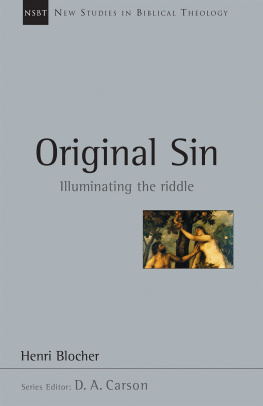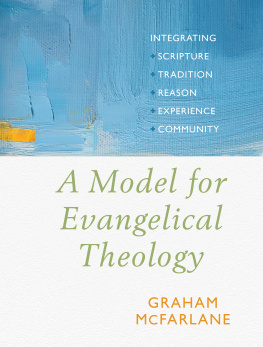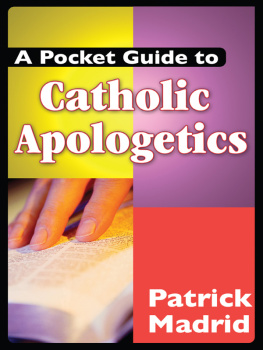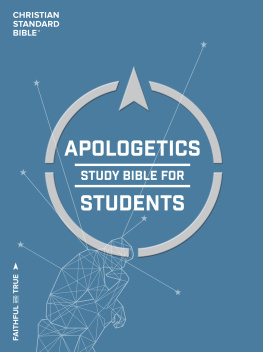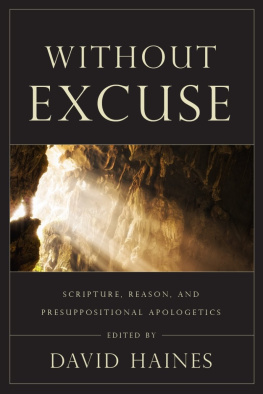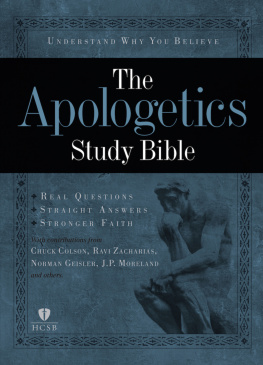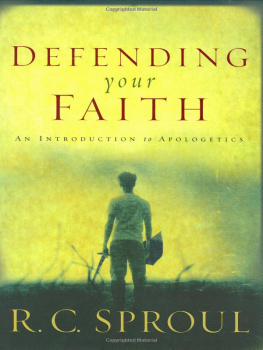Henri Blocher - Faith and Reason
Here you can read online Henri Blocher - Faith and Reason full text of the book (entire story) in english for free. Download pdf and epub, get meaning, cover and reviews about this ebook. year: 2022, publisher: Hendrickson Publishers, genre: Religion. Description of the work, (preface) as well as reviews are available. Best literature library LitArk.com created for fans of good reading and offers a wide selection of genres:
Romance novel
Science fiction
Adventure
Detective
Science
History
Home and family
Prose
Art
Politics
Computer
Non-fiction
Religion
Business
Children
Humor
Choose a favorite category and find really read worthwhile books. Enjoy immersion in the world of imagination, feel the emotions of the characters or learn something new for yourself, make an fascinating discovery.
- Book:Faith and Reason
- Author:
- Publisher:Hendrickson Publishers
- Genre:
- Year:2022
- Rating:5 / 5
- Favourites:Add to favourites
- Your mark:
- 100
- 1
- 2
- 3
- 4
- 5
Faith and Reason: summary, description and annotation
We offer to read an annotation, description, summary or preface (depends on what the author of the book "Faith and Reason" wrote himself). If you haven't found the necessary information about the book — write in the comments, we will try to find it.
Faith and Reason — read online for free the complete book (whole text) full work
Below is the text of the book, divided by pages. System saving the place of the last page read, allows you to conveniently read the book "Faith and Reason" online for free, without having to search again every time where you left off. Put a bookmark, and you can go to the page where you finished reading at any time.
Font size:
Interval:
Bookmark:

Faith and Reason (ebook edition)
2017 Hendrickson Publishers Marketing, LLC
P. O. Box 3473
Peabody, Massachusetts 01961-3473
www.hendrickson.com
ebook ISBN 978-1-68307-274-4
All rights reserved. No part of this book may be reproduced or transmitted in any form or by any means, electronic or mechanical, including photocopying, recording, or by any information storage and retrieval system, without permission in writing from the publisher.
Scripture quotations marked (NIV) are taken from the Holy Bible, New International Version, NIV. Copyright 1973, 1978, 1984, 2011 by Biblica, Inc. Used by permission of Zondervan. All rights reserved worldwide. www.zondervan
.com. The NIV and New International Version are trademarks registered in the United States Patent and Trademark Office by Biblica, Inc.
Scripture quotations marked (ESV) are taken from the Holy Bible, English Standard Version (ESV), copyright 2001, by Crossway, a publishing ministry of Good News Publishers. Used by permission. All rights reserved.
Scripture quotations marked RSV are taken from the Revised Standard Version of the Bible, copyright 1946, 1952, 1971 by the Division of Christian Education of the National Council of the Churches of Christ in the United States of America. Used by permission. All rights reserved.
Scripture quotations marked NKJV are taken from the New King James Version. Copyright 1982 by Thomas Nelson. Used by permission. All rights reserved.
Scripture quotations marked (TLB) are taken from The Living Bible copyright 1971. Used by permission of Tyndale House Publishers, Inc., Carol Stream, Illinois 60188. All rights reserved.
Scripture quotations not marked are the authors translation.
Due to technical issues, this eBook may not contain all of the images or diagrams in the original print edition of the work. In addition, adapting the print edition to the eBook format may require some other layout and feature changes to be made.
First ebook edition May 2019
The memory has remained etched in my mind. It takes me back to a bygone era (I have nothing to hide!) when I was thirteen or fourteen years old. The attempt to argue on behalf of the gospel was not well regarded in the circles around me, and my coming-of-age sensibilities had been instilled with the prevailing negative attitude (yet I was already interested in such things). Along comes a pastor-theologian from Athens, Greece, on a visit to the evangelical communities of the Paris region. I recall his name: Metallinos. His ministry was bearing great fruit: a growing church, the founding of a Bible institute, etc. I thus listen to him with respectful attention. I hear him highlight the role that his expositions on apologetics play for him in the furtherance of the Cause. I am stunned. The impact of the shock will no doubt later help me understand that a negative attitude toward apologetics is not in fact justified by biblical teachingthat in order to overcome an ill-conceived apologetics, for this kind has indeed existed, we need a well-conceived apologetics.
The term apologetics comes from Greek, and derives directly from a word the New Testament employs several times. Apologetics is the art and science of apologia, whose meaning is somewhat broader than that of our own apology (Fr. faire lapologie de, to excuse, rationalize). What is an apologia? It is a defense, in the first instance before a tribunal. The meaning then extends to apply to an ordered, reasonable, and reasoned discourse, seeking to justify a positionor a personso as to defend against an accusation, with a view to bringing about a favorable outcome. The prefix apo indicates a context of reply; logia is akin to logos, which implies reason, deliberation. The sum is that apologetics is about holding yourself accountable for the positions that you advocate. The apostle Paul can thus say that he has been appointed for the apologia of the gospel (Philippians 1:16), namely that he has adopted a discourse that persuades, if possible, his hearers and leads them to faith.
Another use of the term, in a verse which relates directly to the central point of our subject, is particularly interesting. It occurs in 1 Peter 3. The apostle, in context, is exhorting the faithful to patience and purity in conduct. Those whom he is addressing also find themselves in a situation of hostility; they are already persecuted: indeed, they have been cast into the fiery ordeal of testing (1 Peter 4:12 NIV). They should not be surprised by it, but rather consider themselves blessed to suffer for righteousness sake. If they are mistreated because they have acted justly, it is an honor that the Lord bestows on them. But in your hearts reverence Christ as Lord, the apostle tells them (1 Peter 3:15 RSV). Peter here borrows a phrase from the prophet Isaiah, which reads, Give to the L ord (YHWH, Jehovah) the place due him, the place due the most holy God. He applies it to Christ identified as the Lord, in order to encourage the faithful not to shrink back from giving him all the honor due him, even at the very cost of their lives through persecution. Always be prepared to make a defense [apologia] to any one who calls you to account for the hope that is in you, yet do it with gentleness and reverence; and keep your conscience clear, so that, when you are abused, those who revile your good behavior in Christ may be put to shame (1 Peter 3:1516 RSV; Peter employs here the same substantive which signifies, as I explained above, the type of discourse that a lawyer, a politician, or a philosopher might pronounce in support of his positions). Peter calls for an apology against, or rather directed toward, whoever requests a reason, whoever requests an account: With what arguments then do you justify your expectation? Why do you invest all your resources, indeed why do you lay down your very life, to follow this Jesus whom you call Christ? Christians must be ready, according to Peters exhortation, to have a discourse prepared which defends the commitment they have made, to give a reason for the hope that is in them.
Such is the task of the apologist, and we will note here that it involves the exercise of reason, as the word Peter employs in the original (logos) is normally translated (account is also possible). In the New Testament, we can see that the apostles, fully inspired by the Lordthey were not gaffe-prone when speaking in his name (though fallible in personal conduct, in apostolic teaching they were Spirit-led)did apologetics. They prepared discourses which made appeal, in certain respects, to arguments, and that for the purpose of leading their hearers to faith, or rather to confirm them in faith if they were already converted. The relationship between the exercise of reason and the commitment of faith remains an obscure enigma for many, believers and unbelievers alike, which is why the pages that follow treat this relationship first and foremost. They do not claim to treat the topic of apologetics in great depth. They leave aside many theoretical problems or conversely those more linked to practical concernsnotably the problem of problems, namely that of evil, which I have addressed in my book Evil and the Cross. Instead, this book takes as its focus of study the use of reason that has held sway over modernity, and decidedly over a large swath of our late modernity. The use of reason in science, including the natural sciences, with its method of empirical experimentation and its recourse to mathematics, offers the model. The science and faith debate thus plays an important role here. However, the ambition of this sketch is to situate the various topics raised along the way within their wider worldview context, and the context of ultimate concerns relative to the purpose of life itself.
Font size:
Interval:
Bookmark:
Similar books «Faith and Reason»
Look at similar books to Faith and Reason. We have selected literature similar in name and meaning in the hope of providing readers with more options to find new, interesting, not yet read works.
Discussion, reviews of the book Faith and Reason and just readers' own opinions. Leave your comments, write what you think about the work, its meaning or the main characters. Specify what exactly you liked and what you didn't like, and why you think so.


